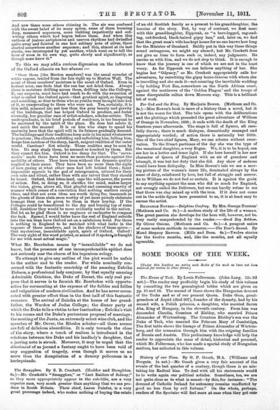For God and the King. By Marjorie Bowen. (Methuen and
Co. 6s.)—Miss Bowen's book is more of a history than a novel, but it is not the worse for that. The tale opens with the deliberations and the plottings which preceded the great adventure of William of Orange in November, 1688 ; it ends with the death of the King fourteen years afterwards. The stage is full of figures, all care- fully drawn ; there is much dialogue, dramatically managed and appropriately worded ; of action there is naturally but little. One of the two chief figures, Mary, we can admire without reser- vation. To the Stuart partisans of the day she was the type of the unnatural daughter, a very Regan. We, it is to be hoped, can see her in a better and truer light. If she bore herself in her new character of Queen of England with an air of grandeur and triumph, it was but her duty that she did. Any show of sadness would have been disloyalty. In Miss Bowen's tale we see a mov- ing picture of the woman's inner life, dominated always by the sense of duty, reinforced by love, but full of- struggle and sorrow. As to William we do not feel so certain. It is against the grain to say anything against the man who did so much for England, not wrongly called the Deliverer, but we can hardly refuse to see that there was clay mixed up with the iron. If it does not come out in the noble figure here presented to us, it is at least easy to excuse the artist.


















































 Previous page
Previous page